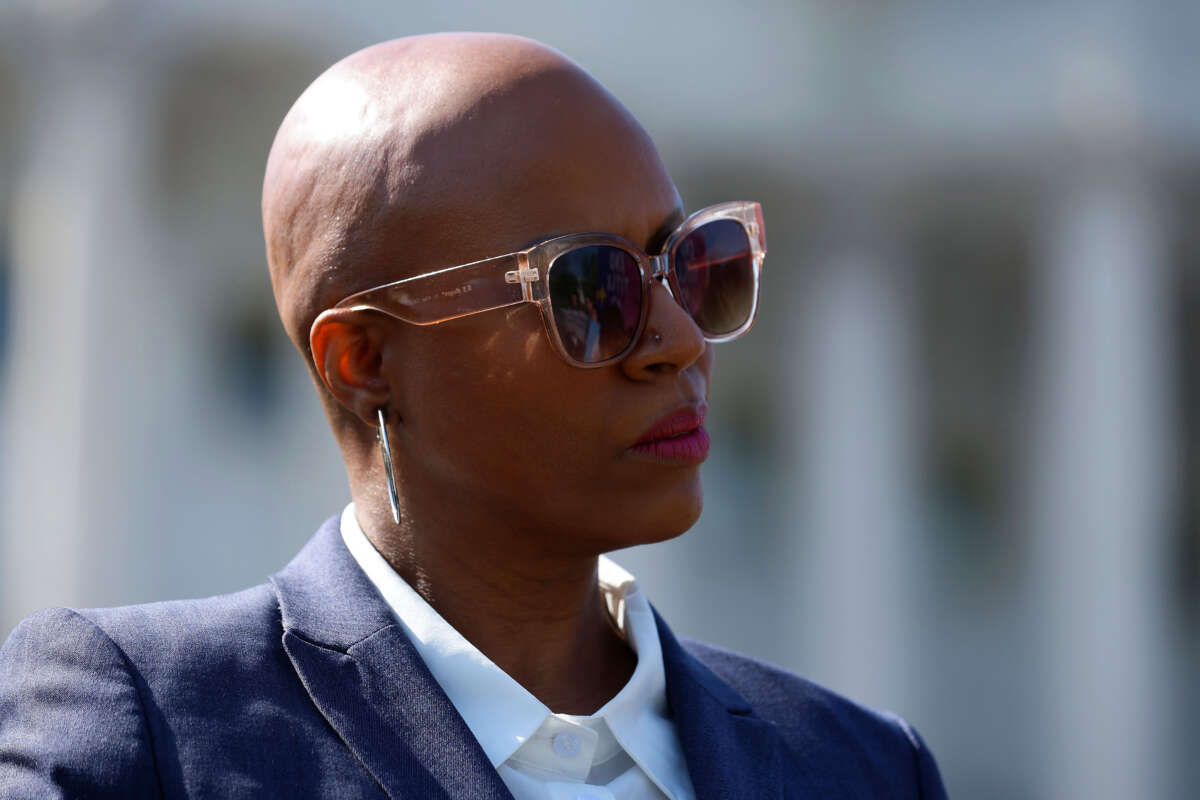Honest, paywall-free news is rare. Please support our boldly independent journalism with a donation of any size.
After the 2020 uprising for Black lives, major banks pledged tens of billions of dollars toward racial equity efforts. Three years later, Rep. Ayanna Pressley (D-Massachusetts) is demanding that major banks account for these pledges to determine whether they have actually made progress on these goals.
On Wednesday, Pressley sent letters to the CEOs of Bank of America, Citi, JPMorgan Chase, U.S. Bank and Wells Fargo, requesting that the banks provide a “comprehensive” audit of the pledged funds, with “clear and detailed descriptions” of progress on supposed goals like changes to lending and other financial services.
“Since the founding of this country, the financial industry has benefited greatly from systemic racism and banks have been lead actors in the discrimination, exploitation, and degradation of Black communities in particular,” Pressley wrote in each of the letters.
“As one of the five largest banks in the United States,” she continued, “it is critical that your financial power is used to rectify the wrongdoing and heal the very communities harmed by the historical and contemporary role that institutions such as yours have played and continue to play in perpetuating racial inequities.”
In the wake of the murder of George Floyd, banks had pledged portions of their resources in attempts to undo their role as architects of racial inequality and the racial wealth gap through historical practices like redlining or straight out denying loans and other services to Black people.
Chase made the largest commitment of $30 billion, while Citi and Bank of America pledged roughly $1 billion each; overall, large corporations committed roughly $50 billion to addressing racial inequality in 2020. The banks said that the money would be going toward expanding housing programs, investing in community financial institutions and generally improving access to banking in underserved communities.
“As the CEO of one of the five largest banks in the nation, you play a key role in determining which individuals and communities have access to economic opportunity,” Pressley wrote. “Your prior statements and pledge are welcome steps, but there needs to be greater transparency on the actions [your bank] has taken.”
But these commitments come from institutions that are notorious for making public relations-friendly pledges and failing to follow up on them. Chase, for instance, unveiled a supposedly major pledge in October 2021 for net-zero carbon emissions by 2050 — and then, just weeks later, lent nearly $800 billion to a coal mining company. In fact, a recent report found that despite their net-zero commitments, major banks have failed to create targets that could actually reduce their climate impacts, like drawing down fossil fuel financing.
Advocates praised Pressley’s letter. “In 1711, Wall Street established an official trading post of enslaved peoples and by the 1830s, big banks were following suit with a practice of selling ‘securitized slave bonds’ to investors. From its inception, the financial industry has profited off racism and that legacy persists today,” said Jessica Church, advocacy and political manager for Take on Wall Street. “We applaud Rep. Pressley’s efforts to hold these banks accountable for the racial equity pledges they made in 2020.”
It’s been difficult to account for the banks’ progress, if any, on their racial equity commitments so far. According to an update from February 2022, Chase claimed that they had already disbursed or committed $13 billion of their commitment for things like affordable housing — though it is already common for banks to finance development projects.
And yet, while the banks have made pledges to fight racism in public, they have all supported a sweeping legal effort to allow them to discriminate with impunity. In October, the U.S. Chamber of Commerce, the American Bankers Association, and the Consumer Bankers Association — trade groups supported by major banks — sued the Consumer Finance Protection Bureau (CFPB) over a decision for the agency to determine discrimination, including racism, as an unfair or abusive practice.
As Revolving Door Project’s Max Moran wrote at the time, the goal of the lawsuit was essentially to “defend their members’ rights to discriminate — often along racial lines.” The ultimate goal of groups like the U.S. Chamber of Commerce is to destroy the CFPB, an agency created in the wake of the Great Recession to protect consumers from fraud and abuse from corporations, especially banks.
A terrifying moment. We appeal for your support.
In the last weeks, we have witnessed an authoritarian assault on communities in Minnesota and across the nation.
The need for truthful, grassroots reporting is urgent at this cataclysmic historical moment. Yet, Trump-aligned billionaires and other allies have taken over many legacy media outlets — the culmination of a decades-long campaign to place control of the narrative into the hands of the political right.
We refuse to let Trump’s blatant propaganda machine go unchecked. Untethered to corporate ownership or advertisers, Truthout remains fearless in our reporting and our determination to use journalism as a tool for justice.
But we need your help just to fund our basic expenses. Over 80 percent of Truthout’s funding comes from small individual donations from our community of readers, and over a third of our total budget is supported by recurring monthly donors.
Truthout has launched a fundraiser to add 500 new monthly donors in the next 9 days. Whether you can make a small monthly donation or a larger one-time gift, Truthout only works with your support.
